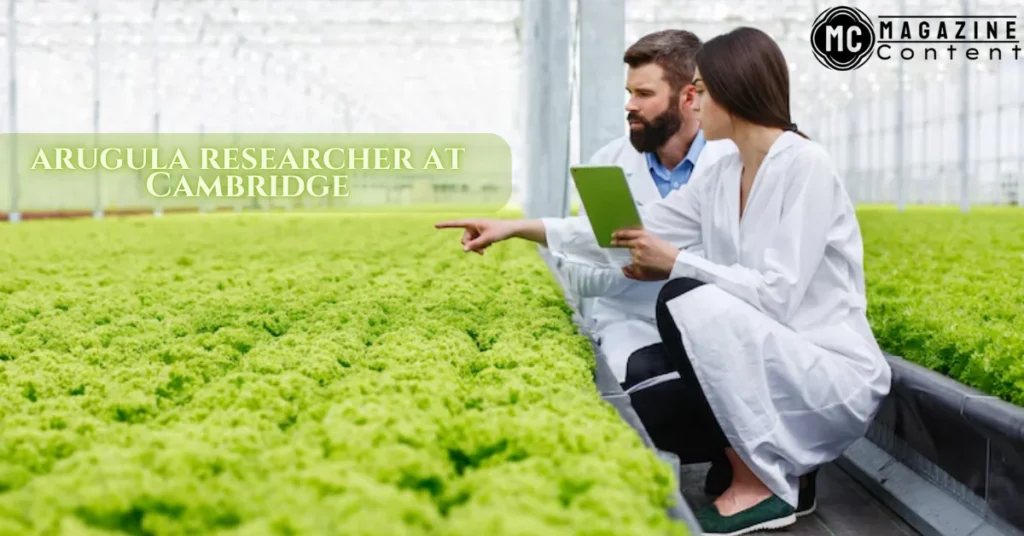Introduction
Climate change is no longer a distant concern—it’s at our doorstep, shaking up how we grow food. As heatwaves, floods, and droughts challenge traditional agriculture, the world is turning to climate-smart farming. And at the heart of this movement? A leafy green you might’ve tossed in your salad—arugula. But not just any arugula. Thanks to one dedicated arugula researcher at Cambridge, this humble plant might soon become a hero in the fight for sustainable food systems.
Meet the Arugula Researcher at Cambridge
The spotlight shines on Dr. Lila Stanton, a passionate agronomist and lead arugula researcher at Cambridge. With a Ph.D. in Plant Sciences and years spent studying leafy greens in volatile environments, Dr. Stanton is now spearheading a groundbreaking initiative focused on climate-smart farming through arugula research.
Her work blends the precision of lab science with the unpredictability of nature—bridging gaps between data and dirty hands in the soil.
What is Climate-Smart Farming?
At its core, climate-smart farming is about growing smarter, not harder. The approach rests on three main pillars:
- Increasing agricultural productivity sustainably
- Adapting and building resilience to climate change
- Reducing greenhouse gas emissions from farming
It’s not about reinventing the wheel, but realigning it to roll with the planet’s changing rhythms.
Why Focus on Arugula?
You might be wondering—why arugula of all crops?
Here’s the kicker: arugula (also known as rocket) is not just a trendy salad ingredient. It’s a nutrient-rich, quick-growing, and highly adaptive plant. Its short growth cycle makes it a fantastic candidate for experiments and innovations in climate response.
Plus, its global demand is climbing, making it an economically viable choice for small- and large-scale farmers alike.
ALSO READ: Fintechzoom.com Nickel: Tracking Market Trends and Insights
Arugula’s Climate Sensitivity
Despite its resilience, arugula is surprisingly sensitive to temperature fluctuations and moisture levels. Too much heat and the leaves turn bitter. Too little water and it stunts.
Dr. Stanton’s research zeroes in on these fine margins—working to breed and cultivate arugula varieties that can thrive under stress while maintaining flavor, yield, and nutritional value.
Cambridge’s Role in Agricultural Innovation
Cambridge isn’t just about libraries and laboratories—it’s a global leader in innovation. The university’s Department of Plant Sciences has been a hub for agri-tech breakthroughs for decades.
With access to cutting-edge tools, international networks, and funding, researchers like Dr. Stanton are empowered to push boundaries and reimagine the future of food.
Advanced Research Techniques Used
Cambridge’s arugula research is anything but old-school. The team is harnessing:
- Genomic sequencing to identify climate-resilient genes
- AI modeling to predict arugula’s response to various climates
- Controlled Environment Agriculture (CEA) to simulate future growing conditions
They’re not just planting seeds—they’re planting data.
ALSO READ: Aavmaal: Transforming Farming with Regenerative Practices
Data-Driven Farming
Thanks to real-time sensors, drone surveillance, and machine learning, the team can track plant growth down to the millimeter. This isn’t guesswork—it’s farming by algorithm.
By comparing lab simulations with real field conditions, the research gets closer to real-world applicability.
Case Studies from the Lab
One promising result: a drought-tolerant arugula strain that maintained 92% of its yield under water-stressed conditions. Another variant showed better resistance to pests without needing chemical inputs.
These aren’t just numbers—they’re potential game-changers for farmers on the climate frontlines.
Collaborations and Funding
This work doesn’t happen in a vacuum. The arugula researcher at Cambridge collaborates with institutions like:
- The CGIAR climate research program
- The UK Met Office
- Local farming cooperatives
Support comes from government-backed initiatives, EU grants, and even private eco-tech investors.
Impact on Local and Global Farming
For UK farmers, these findings could offer a more sustainable, profitable way to grow leafy greens with fewer inputs. For farmers in drought-prone regions, they could be the difference between a failed harvest and food on the table.
In a world grappling with food security, every leaf counts.
Challenges and Limitations
Of course, it’s not all sunshine and sprouting. Challenges include:
- Securing long-term funding
- Scaling lab results to unpredictable field conditions
- Convincing farmers to adopt new practices
But with every hurdle, comes innovation—and Dr. Stanton is no stranger to thinking outside the planter box.
The Future of Arugula in Climate-Smart Agriculture
Looking ahead, arugula might be one of many crops revolutionized through science. With smart greenhouses, hydroponic systems, and community-driven agri-tech, the goal is clear:
Food that feeds both people and the planet.
And thanks to the arugula researcher at Cambridge, that goal is closer than ever.
How You Can Support Climate-Smart Farming
Not a farmer? No problem. Here’s how you can help:
- Buy local, seasonal produce
- Support research through crowdfunding or awareness
- Educate yourself and others about climate-resilient crops
Every choice adds up. Be part of the solution.
Conclusion
The humble arugula is proving to be a mighty player in the climate-smart revolution. With visionaries like the arugula researcher at Cambridge leading the charge, the future of food looks a lot more sustainable—and a little more leafy.
From soil to science, we’re seeing the beginning of a transformation that could redefine how—and what—we eat in a warming world.
ALSO READ: views-source:https://roobx4uuu.blogspot.com: Your Guide to Trends & More
FAQs
What is climate-smart farming?
Climate-smart farming is an agricultural approach that aims to sustainably increase productivity, adapt to climate change, and reduce greenhouse gas emissions.
Why is arugula a focus crop in this research?
Arugula is fast-growing, nutrient-rich, and responsive to environmental changes, making it ideal for experimentation and climate adaptation.
What makes Cambridge ideal for this kind of research?
Cambridge offers world-class facilities, experienced researchers, and a strong support system for scientific innovation in agriculture.
How will this research affect global food security?
By developing resilient crops like arugula, this research can help stabilize food supplies and support farming communities worldwide.
Can everyday people support this mission?
Yes! Through informed food choices, supporting sustainable farming initiatives, and spreading awareness, anyone can contribute.






